London: 1674. It has been eight years since the Great Fire destroyed the medieval city. King Charles II, 14 years into his restoration, has just signed the Second Peace of Westminster, marking an end to two decades of intermittent war with the Dutch. Barely a generation has passed since the introduction of “tea”. The fusion of England and Scotland into the United Kingdom is still thirty years away.
In the colonies, New York, New Jersey, and Delaware are just a decade old, and Pennsylvania is but a twinkle in William Penn’s eye. In the older colonies of New England, tensions between settlers and natives are heating up, but the bloody war that will cement European dominance in the region won’t begin until next year. Bacon’s Rebellion, an alliance between white and black colonists against the government of Virginia, will lead to some of the first laws explicitly linking slavery to skin color, but that’s two years away. The Salem Witch Trials won’t happen until the 1690s.
At the University of Cambridge, the future “Sir” Isaac Newton has just discovered the visible light spectrum and is still in the process of inventing gravity and calculus. But another, dare I say a greater, mind, has already completed his own Principia-tier masterwork. For as wars were fought, and British hegemony began to take shape, England’s gamesters toiled away at their games of “gleek” and “lanterloo” in their long white wigs and buckle hats. Their lives would be documented in 1674 when author, poet, and gaming legend Charles Cotton anonymously published one of the earliest compendia of games in the English language: The Compleat Gamester, OR, - the “or” is how you know it’s going to be good - OR, FULL and EASY INSTRUCTIONS FOR Playing at all Manner of usual, and most Genteel GAMES, after the best Method. VIZ. I Ombre, Piquet, with a Song on the same; Lanterloo, Whist, and a great Variety of other GAMES on the CARDS. II. The Famous Game of Verquere, Tick-Tack, Irish, Back-Gammon. III. Inn and Inn, Passage, Hazard, the Royal Game at Chess, and Billiards. To which is Added. The Gentleman’s Diversion, In Riding, Racing, Archery, Cock-Fighting, and Bowling. All regulated by the most Experienced MASTERS. I hope you can forgive my keyboard’s lack of medial s.

I discovered this book in a Wikipedia reference the other day and I am enchanted by the word “gamester” so here is my book review. The University of Michigan has a digital transcription of the whole thing here and the English isn’t too old to be illegible, and there are several scanned antique copies on the Internet Archive, from which I have sourced the images in this post.
The book begins, as all great non-fiction works do, with a poem describing the cover art. I’ve quoted it below alongside the part of the woodcut he’s talking about as a way to structure this post.
Billiards
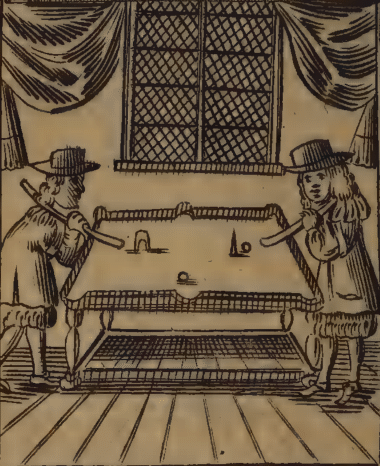
Billiards from Spain at first deriv’d its name,
Both an ingenious, and a cleanly Game.
One Gamester leads (the Table green as grass)
And each like Warriers strive to gain the Pass.
But in the contest, e’re the Pass be won,
Hazzards are many into which they run.
Thus whilst we play on this Terrestrial Stage,
Nothing but Hazzard doth attend each age.
Look at their hats!! Look at their hair!! Sorry, I got distracted, but these little woodcut cartoons are delightful and I love them.
First up, billiards, but this isn’t the American “pool” you may be familiar with. In the section on billiards, Cotton describes a components called a “port” and a “king” which I believe are the little arch and the little cone on the table in the woodcut. Whoever can knock their ball closest to the king goes first. There are only two balls, one for each player, and if I’m understanding Cotton’s olde dialect properly you have to knock your ball through the port without knocking it over and then hit the king to win. You lose by knocking your ball into a “hazzard” (the pockets) or by having your ball knocked into a hazard by your opponent’s ball. It seems a lot closer to something like lawn bowling, but on a smaller scale so you can play it indoors.
As Cotton tells it, billiards originated in Italy, which seems to conflict with his poem’s claim that it’s name is Spanish? At any rate, he claims that it was incredibly popular, “there being few Towns of note therein which hath not a publick Billiard-Table”. My question is, if it was that popular in 1674, why was there so much Trouble in River City about pool two hundred years later? Surely people would have gotten accustomed to it by then? I guess the answer is in the relationship between “gentile and cleanly” gaming and the more “lewd” gambling, the tension between which is very evident in The Compleat Gamester.
Dice
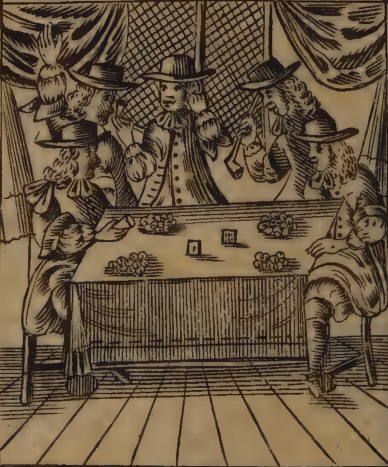
Next here are Hazzards play’d another way,
By Box and Dice; ‘tis Hazzard is the Play.
The Bully-Rock with mangy fist, and Pox,
Iustles some out, and then takes up the Box.
He throws the Main, and crys, Who comes at Seven?
Thus with a dry fist nicks it with Eleven.
If out, he raps out Oaths I dare not tell,
Hot, piping out, and newly come from Hell.
Old-Nick o’re-hearing, by a Palming-trick
Secures the Gamester; thus the Nickers nickt.
Next up we have dice games, particularly hazard. Some nice philosophical wordplay here from Cotton transitioning us into this section. If you’re as confused as I was about what “iustles” means, he means “jostles” - they still didn’t have J then I guess - referring to rolling the dice. I had to look up a modern description of the rules for this because Cotton’s are incredibly confusing:
There are two things chiefly to be observed, that is, Main and Chance; the Chance is the Casters, and the Main theirs who are concerned in play with him. There can be no Main thrown above nine and under five; so that five, six, seven, eight and nine are the only Mains and no more which are flung at Hazzard; Chances and Nicks are from four to ten, thus four is a chance to nine, five to eight, six to seven, seven to six, eight to five; and nine and ten a chance to five, six, seven and eight: in short, four, five, six, seven, eight, nine and ten are chances to any Main, if any of these Nick it not: now Nicks are either when the chance is the same with the Main, as five and five, six and six, seven and seven, and so on, or six and twelve, seven and eleven, eight and twelve; where note, that twelve is out to nine, seven, and five; and eleven is out to nine, eight, six, and five; Ames-Ace, and Deuce-Ace, are out to all Mains what ever.
That is one sentence. Maybe this makes sense to you if you’re a big craps-head, but trying to understand this barrage of numbers turned my brain to mush. Similar to cookbooks of the time period, The Compleat Gamester lacks a certain refinement in instruction-giving. But essentially, you roll two dice until you get a certain sum up to three times, and depending on which numbers you roll in which order you either win or lose. It’s basically an antique version of craps.
One thing I like about this section is the 17th century depiction of Gamer Rage. I, too, have heard “Oaths I dare not tell” in my days playing League of Legends.
Tables
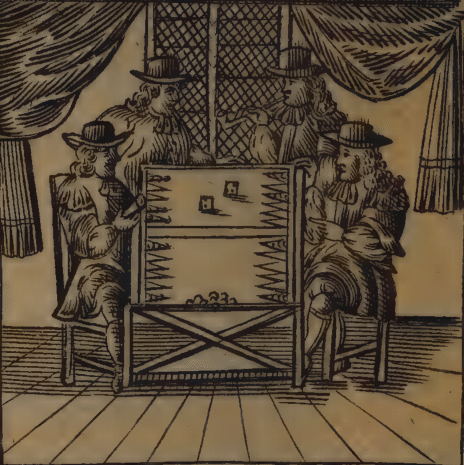
Now t’ Irish, or Back-Gammoners we come,
Who wish their money, with their men safe home;
But as in War, so in this subtle Play,
The stragling men are ta’ne up by the way.
By entring then, one reinforceth more,
It may be to be lost, as those before.
By Topping, Knapping, and foul play some win;
But those are losers, who so gain by sin.
The predecessor to modern backgammon was a game called “The Irish Game” or just “Irish”. I’m really curious what sort of connotations that was supposed to have in post-Cromwell England. This was news to me, but backgammon comes from an entire lineage of “tables games” that share what I always thought of as “the weird pointy backgammon board” (it’s called a tables board). The Compleat Gamester contains rules for playing “Irish”, “Back-Gammon”, “Tick-Tack”, “Dubblets”, “Sice-Ace”, and “Ketch-Dolt”, all which share a board but use different amounts of dice and game pieces. I wonder what happened that backgammon is the only one of these I’ve ever heard of. If you’re out there still playing ketch-dolt please let me know, I’m curious.
Cock-fighting
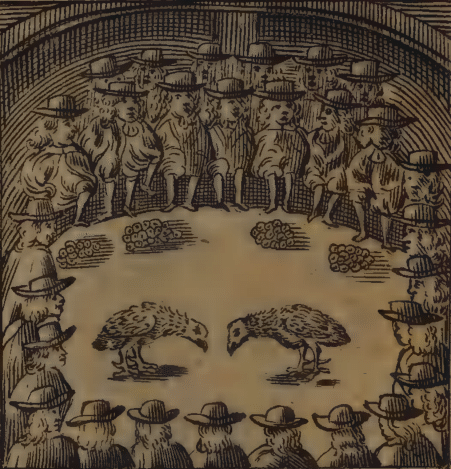
After these three the Cock-pit claims a name;
A sport gentile, and call’d a Royal Game.
Now see the Gallants crowd about the Pit,
And most are stockt with Money more than Wit;
Else-sure they would not, with so great a stir,
Lay ten to one on a Cocks faithless Spur.
Oh baby, it’s time for everybody’s favorite game that we play: cock-fighting. I think it’s really funny that this counts as a “gentile” game up there with billiards. Clearly class is more important than violence when it comes to social acceptibility here - the gentry are the ones that can afford to keep fighting cocks so that’s what’s gentile. This containing sub-section for the cock-fighting chapter is titled “The Gentlemen’s Diversion” and includes pastimes characterized by their inaccessibility: cock-fighting (expensive to have a chicken you won’t eat), horseback riding (expensive to have a horse), archery (expensive to have a weapon), and bowling (expensive to have a field to throw balls at). This is the “PC with an RTX 4090” section of the book.
We do get a bit of interesting social commentary here - Cotton doesn’t seem like he has a high opinion of people that gamble on cock-fights, judging by the poem. This disdain does not extend to cock-fighting in a vacuum, though:
Cocking is a sport or pastime so full of delight and pleasure, that I know not any Game in that respect is to be preferred before it
In contrast to the preceding chapters, the cock-fighting chapter is light on rules and largely about how to select, raise, and care for a fighting cock, with sections such as “Of Dieting and ordering a Cock for Battel” and “Cures for some distempers in a Cock, Chick, or Hen o’th’ Game.” There actually isn’t much information on the fights themselves, it skips straight from “How to prepare Cocks for Fight” to “How to order Cocks after battel, and how to cure wounds.” I guess the cocks figure out the fighting part by themselves. And of course, the chapter ends with a lengthy poem by a Dr. R. Wild about the pleasures of cock-fighting.
I found this chapter kind of fascinating as a peek into the mentality of people who make animals kill each other for fun. The emphasis is all on, basically, how to take care of a pet chicken, and I can’t imagine going to all this trouble of giving it a nice habitat and feeding it well and caring for it just to force it to get mauled to death by another bird. Like, seriously, the lengths Cotton suggests you go to, for example, detox your bird so it’ll fight good:
Towards four or five a clock in the evening take them out of their Stoves, and having lickt their eyes and head with your tongue, put them into their Pens, and having filled their Troughs with square-cut-manchet, piss therein, and let them feed whilst the Urine is hot; for this will cause their scouring to work, and will wonderfully cleanse both head and body.
Like, I’m sorry, absolutely not, I will not be licking my chicken’s eyeballs nor will I piss in their food, thank you very much. It’s all weird-ass humoral medicine shit like this, like straight up there is so much piss involved in this section it’s unreal.
The battel being ended, immediately search your Cocks wounds, as many as you can find, suck the blood out of them, then wash them well with warm urine, and that will keep them from ranckling; after this give him a roll or two of your best scowring, and so stove him up as hot as you can for that night; in the morning, if you find his head swell’d, you must suck his wounds again, and bathe them again with warm urine, then take the powder of herb Robert, and put it into a fine bag, and pounce his wounds therewith; after this give him a good handful of bread to eat out of warm urine, and so put him into the stove again, and let him not feel the air till the swelling be fallen.

Anyway, if you put aside the descriptions of animal abuse this chapter is a hoot to read. Take a shot every time Cotton uses the word “cock” in a funny way if you want to develop kidney failure.
In matching, take notice of these two things; first, the length of Cocks, secondly, the strength of Cocks; for the length, if your Adversaries Cock be too long, yours shall hardly catch his head, and so be incapable of indangering eye or life; and if he be the stronger, he will overbear your Cock, and not suffer him to rise or strike with any advantage. […] You shall know the dimension of the garth by the measure of your hands, griping the Cock about from the points of your great finger to the joynts of your thumbs, and either of these advantages by no means give your Adversary; if you doubt loss in the one, be sure to gain in the other: for the week long Cock will rise at more ease, and the short strong Cock will give the surer blow.
Cards
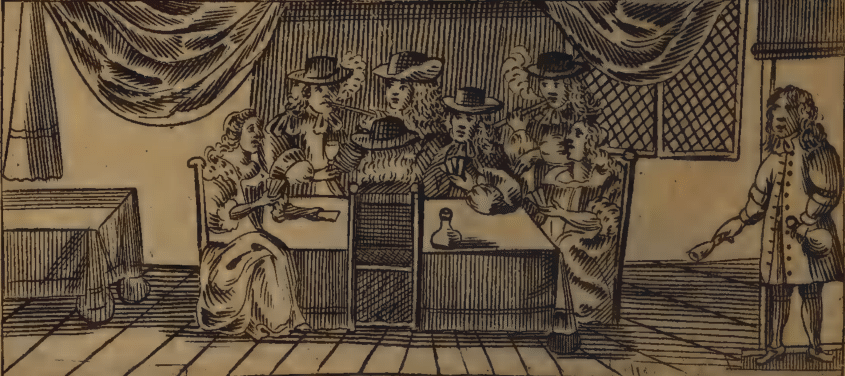
Lastly, observe the Women with what grace
They sit, and look their Partners in the face.
Who from their eyes shoot Cupids fiery Darts;
Thus make them lose at once their Game and Hearts.
Their white soft hands, (when e’re the Cards they cut)
Make the men wish to change the Game to Putt.
The Women knew their thoughts, then cry’d, Enough,
Lets leave off Whist, and go to Putt, or Ruff.
Ladies don’t trust your secrets in that hand,
Who can’t their own (to their great grief) command.
For this I will assure you, if you do,
In time you’l lose your Ruff and Honour too.
Finally, the largest section of the woodcut the is dedicated to the most important and harrowing game of all: women. Darn women, always distracting me from my game. Joke’s aside, this one’s depicting card games. I think the bit in this section of the poem is that the men want to switch the game from “whist” to “putt” because putt requires more shuffling, thus allowing the men to ogle the ladies’ exposed hands. That’s where folks were in 1674, I guess. The card game section is The Compleat Gamester’s longest, and I will not be detailing the rules to all of these, except to say that their names are amazing. People still play cribbage, but have you ever heard of “Gleek”? What about “Lanterloo”?
Cotton clearly plays some favorites in this section. For example, chapter 1.2 is called “Of French Ruff” and 1.7 is just “Beast”, while the gleek chapter gets “The Game at Gleek”, chapter 1.8 is “The ingeneous and pleasant Game of Bragg”, and chapter 1.10, about a game called “piquet”, includes an entire song from a “Mr. D’Urfey” that is apparently “Famous at Court”.
Chess
You may be wondering, what about chess? Isn’t chess like super old? Well it is in here, categorized under “Games without the TABLES” along with the dice games and billiards. Cotton’s description makes it sound almost esoteric and set apart from other games by it’s complexity:
Chess is a Royal Game and more difficult to be understood than any other Game whatever, and will take up sometimes in the playing so long a time that I have known two play a fortnight at times before the Game hath been ended: and indeed I believe the tediousness of the Game hath caus’d the practice thereof to be so little used; however since this pastime is so highly ingenious that there is none can parallel it, I shall here lay down some brief instructions tending to the knowledg thereof.
Unfortunately there’s no associated woodcut for chess, but Cotton does describe the shape of the game pieces and the game setup in great detail. The rest of the chapter delves into chess strategy with zero poetry or social commentary. I’m not a big chess buff so I’d be interested to know if any of Cotton’s tips hold up as good or interesting advice.
The Character of a Gamester
The Compleat Gamester is not a strictly technical work - Cotton cares as much about the behavior of players as he does the rules of the games themselves. Gambling and gamblers come up like every other chapter. For example, in the chapter on bowling:
A Bowling-Green, or Bowling-Ally is a place where three things are thrown away besides the Bowls, viz. Time, Money and Curses, and the last ten for one. The best sport in it, is the Gamesters, and he enjoys it that looks on and betts nothing.
I cannot fathom betting on bowling of all things. Is throwing orbs around not entertaining enough for you people? But I could say the same thing for modern action-adventure games, and yet Genshin Impact has people gambling on anime girls. The more things change, the more they stay the same, I guess. Plus, I think time has proven that you don’t need to be betting to get heated about bowling:
To Cotton it doesn’t seem like there was a very clear line between “gaming” and “gambling”. Take these excerpts from the section “The Character of a Gamester”:
Some say he was born with Cards in his hands, others that he will die so; but certainly it is all his life, and whether he sleeps or wakes he thinks of nothing else.
All we know, is he’s called The Stig.
He loves Winter more than Summer, because it affords more Gamesters, and Christmas more than any other time, because there is more gaming then.
This man will play like Nero when the City is on fire, or like Archimedes when it is sacking, rather than interrupt his Game. If play hath reduced him to poverty, then he is like one a drowning, who fastens upon any thing next at hand. Amongst other of his shipwracks, he hath happily lost shame, and this want supplies him. No man puts his brain to more use than he; for his life is a daily invention, and each meal a new stratagem, and like a flie will boldly sup at every mans cup.
Men shun him at length as they do an Infection
On one hand, this is very similar to how people still talk about gambling addicts. But then, we also have the stereotype of the World of Warcraft player, for example, who ignores the world around them in favor of raiding with their clan. And what is the following if not ye olde throwing one’s controller through the TV screen?
I have seen some Dogs bite the stones which boys have thrown at them, not regarding whence they were flung; so I have seen a losing Gamester greedily gnawing the innocent Box, and sometimes tearing it to pieces as an accessary to his throwing out;
It all reminds me a bit of the modern strawman of the Gamer who claims oppression when his partner asks for help with household chores. But it’s all a bit tongue-in-cheek, I don’t think Cotton would have written this entire encyclopedia if his opinion of the average gamester were really totally negative. I think a more accurate view of Cotton’s sentiment towards gaming can be seen in “The Epistle to the Reader”:
It is not (I’le assure you) any private interest of my own that caus’d me to adventure on this subject, but the delight and benefit of every individual person; Delight to such who will pass away their spare minuts in harmless recreation if not abus’d; and Profit to all, who by inspecting all manner of Games may observe the cheats and abuses, and so be arm’d against the injuries may accrue thereby.
Certainly there is no man so severe to deny the lawfulness of Recreation; There was never any Stoick found so cruel, either to himself, or nature, but at some time or other he would unbend his mind, and give it liberty to stray into some more pleasant walks, than the miry heavy ways of his own sowr, willful resolutions. You may observe the Heathen Sages of the first world founded with their Laws their Feasts, with their Labours their Olympicks, with their Warfare their Triumphs. Nay at this day the severest Dionysian-Pedagogue will give his Scholars their Play-days, & Breakings up with a Horum miserere laborum fessum quies plurimum juvat. (“To take pity on these labors is a great help to the rest of the weary”)
Cotton is remarking on the universality of play and the joy it brings to people - if not abused, of course. We have laws, and we have festivals; we have labor and we have sports. I recall a similar sentiment regarding the importance of recreation in academic stuff I read in college and it’s very fun to see that sentiment here, basically verbatim, in a book from 1674. Even though the fashions, sensibilities, and general understanding of the world has changed a lot since then, gamers’ relationships to the games they play have not.
Sources
- Cotton, Charles. 1674. The compleat gamester, or, Instructions how to play at billiards, trucks, bowls, and chess together with all manner of usual and most gentile games either on cards or dice : to which is added the arts and mysteries of riding, racing, archery, and cock-fighting. London: Printed by A.M. for R. Cutler and to be sold by Henry Brome. University of Michigan Library Early English Books Online Text Creation Partnership, 12/7/2023.
- Cotton, Charles. 1721. The compleat gamester: or, full and easy instructions for playing at all manner of usual, and most genteel games, after the best method … To which is added The gentleman’s diversion. London: F. Willfrod. Internet Archive, 12/7/2023.
- United States History: 1600-1699 Timeline. College of Southern Idaho Library Research Guides, 12/7/23.
- The Compleat Gamester. Wikipedia, 12/7/2023.
- Charles Cotton. Wikipedia, 12/7/2023.
- Timeline of British history (1600-1699). Wikipedia, 12/7/2023.
- Michael Rieppel. Welcome to the Game of Hazard. https://mrieppel.github.io/hazard/, 12/7/2023.
